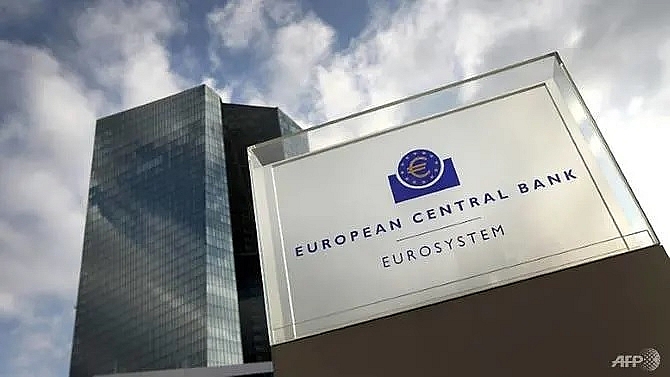ECB unveils hotly-awaited stimulus package
 |
| Financial markets already expect the ECB to trim key rates at its policy meeting in September AFP/Daniel ROLAND |
A key interest rate deeper into negative territory, new net purchases of government and corporate debt and support to struggling banks were all agreed at the Frankfurt meeting, a spokeswoman said.
With lower rates, ECB policymakers "are trying, and succeeding, in depreciating the Euro against the VERY strong dollar, hurting US exports," US President Donald Trump complained in a tweet soon after the decision.
The moves mean ECB president Mario Draghi, who will yield his seat to departing International Monetary Fund chairwoman Christine Lagarde on Oct 31, has set the tone for her first months - and possibly years - in office, although he will chair a final meeting next month.
"The final showdown has started with a big bang. The ECB just announced a big policy package to revive the Eurozone economy and to bring inflation back to target," said ING analyst Carsten Brzeski.
Looking in more detail at the measures, the interest rate on banks' deposits with the ECB will drop to -0.5 per cent, from -0.4 previously.
Negative rates mean lenders pay the central bank to park their cash in Frankfurt.
Meanwhile the ECB left its two other headline rates unchanged, and said that all three would remain at present or lower levels "until it has seen the inflation outlook robustly converge" towards its just-below-two-per cent target.
The "forward guidance" on rates abandons previous language naming mid-2020 as the earliest possible date for a rate hike.
NEW BOND-BUYING
The biggest question ahead of Thursday was whether the central bank would restart "quantitative easing" (QE) net purchases of bonds, which amounted to €2.6 trillion (US$2.9 trillion) between 2015 and 2018.
Despite public opposition from governing council members like Germany's Jens Weidmann or Dutchman Klaas Knot, QE will resume from Nov 1, at a pace of €20 billion per month "for as long as necessary" to boost inflation.
"The key point is that this commitment to more QE is open-ended," commented Andrew Kenningham of Capital Economics.
But governors stopped short of committing to the €600 billion of QE that Pictet Wealth Management strategist Frederik Ducrozet said could prove necessary.
On top of the rates and bond-buying moves, policymakers also agreed a "tiering" system to spare some of banks' deposits the harshest negative rates, after years of complaining from financial firms.
Uncushioned negative rates had so far cost eurozone lenders around seven billion euros per year.
Lastly, the ECB confirmed its latest round of "TLTRO" cheap loans to banks will go ahead from Sep 19, offering more favourable conditions to those who lend cash on to the real economy.
While he cast the measures as "dovish" - or supportive - Kenningham said "it remains doubtful ... that this will do much to reboot the eurozone economy, let alone achieve the near-two-percent inflation target".
WASHINGTON WATCHING
The September package aims to buttress the eurozone against the impact of trade wars, especially between the US and China, as well as weakening emerging markets and a looming no-deal Brexit.
But the ECB's very attempts to shore up the economy could attract fresh trouble from Washington.
"This could well mean a renewed focus by the Trump administration on auto tariffs," warned Nomura analyst Chiara Zangarelli ahead of the meeting.
It will be up to Draghi to defend the governing council's measures at a 2.30pm (1230 GMT) press conference.
The Italian economist will also unveil the ECB staff's latest quarterly economic projections, likely slightly more pessimistic than those presented in June after months of weakening economic data.
Eurozone industrial production fell 0.4 per cent month-on-month and 2.0 per cent year-on-year in July, data released earlier Thursday showed, and powerhouse Germany is on the brink of recession.
Any deepening of the US-China conflict or new hurdles to trade in case of a no-deal Brexit could further darken the economic outlook.
What the stars mean:
★ Poor ★ ★ Promising ★★★ Good ★★★★ Very good ★★★★★ Exceptional
 Tag:
Tag:
Related Contents
Latest News
More News
- Cashless payments hit 28 times GDP in 2025 (February 04, 2026 | 18:09)
- SSIAM and DBJ launch Japan Vietnam Capital Fund (February 04, 2026 | 15:57)
- Banks target stronger profits, credit growth in 2026 (February 04, 2026 | 15:43)
- Vietnam on path to investment-grade rating (February 03, 2026 | 13:07)
- Consumer finance sector posts sharp profit growth (February 03, 2026 | 13:05)
- Insurance market building the next chapter of protection (February 02, 2026 | 11:16)
- NAB Innovation Centre underscores Vietnam’s appeal for tech investment (January 30, 2026 | 11:16)
- Vietnam strengthens public debt management with World Bank and IMF (January 30, 2026 | 11:00)
- Corporate bond market poised for stronger growth cycle (January 28, 2026 | 17:13)
- Vietnam's IPO market on recovery trajectory (January 28, 2026 | 17:04)






















 Mobile Version
Mobile Version